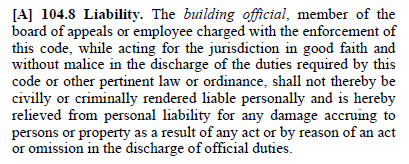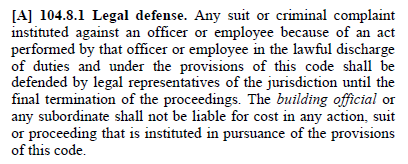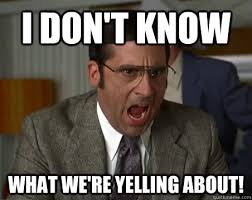-
Welcome to The Building Code Forum
Your premier resource for building code knowledge.
This forum remains free to the public thanks to the generous support of our Sawhorse Members and Corporate Sponsors. Their contributions help keep this community thriving and accessible.
Want enhanced access to expert discussions and exclusive features? Learn more about the benefits here.
Ready to upgrade? Log in and upgrade now.
You are using an out of date browser. It may not display this or other websites correctly.
You should upgrade or use an alternative browser.
You should upgrade or use an alternative browser.
Thoughts On This
- Thread starter jar546
- Start date
tmurray
SAWHORSE
It is strange that there is a system where you expect the building inspector to act in the best interest of society as a whole, but then when they fail to do this, there are functionally no consequences for this failure.
I can understand the argument that a building inspector must act with the benefit of society in mind, and that one person may find themselves on the short end of that stick, so there must be some level of protection there. I just really question if statutory immunity is the vehicle to get there.
The reality is that enforcement of the codes benefit society and the owner the overwhelming amount of time, so why would there need to be statutory immunity? Why not the Anns test or a similar legal test?
I can understand the argument that a building inspector must act with the benefit of society in mind, and that one person may find themselves on the short end of that stick, so there must be some level of protection there. I just really question if statutory immunity is the vehicle to get there.
The reality is that enforcement of the codes benefit society and the owner the overwhelming amount of time, so why would there need to be statutory immunity? Why not the Anns test or a similar legal test?
TheCommish
SAWHORSE
the argument needs more context of the issue being discussed
Sifu
SAWHORSE
- Joined
- Sep 3, 2011
- Messages
- 3,578
Agree with the commish, need context. But in general I don't like the idea of blanket immunity and don't think we have it when committing malfeasance, nonfeasance or misfeasance. The issues arise when trying to demonstrate one of those concepts, and frankly when most AHJ's and BO's don't know what they are or have never thought about how they tie into the authority and responsibility we have. It seems to be difficult to prove any of those in overcoming the idea of governmental immunity.
I have never, and will never do my job with the IDEA that I am immune from the consequences of my actions. In fact I approach my job assuming I could be hauled into court at any given time, if not for culpability, at least for justification and reasoning, and I better have both. I believe that if I demonstrate sound decision making based on written code and critical thinking I will be immune, not because there is an immunity doctrine.
I have never, and will never do my job with the IDEA that I am immune from the consequences of my actions. In fact I approach my job assuming I could be hauled into court at any given time, if not for culpability, at least for justification and reasoning, and I better have both. I believe that if I demonstrate sound decision making based on written code and critical thinking I will be immune, not because there is an immunity doctrine.
jar546
CBO
While I agree with you, I believe my point was to show the perception in court, or at least this court.the argument needs more context of the issue being discussed
Yankee Chronicler
SAWHORSE
Too short and too lacking in context for me to get anything from it.
One of the parties (I had difficulty keeping track of who was speaking) made reference to the police power, and to inspections being discretionary acts. The other thing [some of] our actions might be is ministerial. The difference isn't explained, but it's important. It is discussed in the ICC book on Building Department Administration.
One of the parties (I had difficulty keeping track of who was speaking) made reference to the police power, and to inspections being discretionary acts. The other thing [some of] our actions might be is ministerial. The difference isn't explained, but it's important. It is discussed in the ICC book on Building Department Administration.
If Building Inspectors weren't granted some kind of immunity, you'd have to pay them a LOT more.
"Hey buddy, we need you to do this difficult and challenging job for chicken scratch, cool? Oh, by the way, if you F- up, you could go to jail and lose everything. Cool-cool?"
"Hey buddy, we need you to do this difficult and challenging job for chicken scratch, cool? Oh, by the way, if you F- up, you could go to jail and lose everything. Cool-cool?"
Yikes
SAWHORSE
Yep, that's why we architects and engineers have licenses and insurance. I'm being advised to put my home in my wife's name or in an LLC."Hey buddy, we need you to do this difficult and challenging job for chicken scratch, cool? Oh, by the way, if you F- up, you could go to jail and lose everything. Cool-cool?"
tmurray
SAWHORSE
If Building Inspectors weren't granted some kind of immunity, you'd have to pay them a LOT more.
"Hey buddy, we need you to do this difficult and challenging job for chicken scratch, cool? Oh, by the way, if you F- up, you could go to jail and lose everything. Cool-cool?"
Building inspectors don't get immunity here. The courts provide a lot of leeway to building officials (more than they should in my opinion). The building departments that have been successfully sued more than deserved it.
Also, we would not be imprisoned. Failure to ensure a building meets code is a tort, not a criminal offence, so jail is not an option.
Without statutory immunity the level of expertise of building inspectors would rise. They would be even more difficult to find than they are now.
Can your future be decided by a judge or jury that haven't a clue about construction or codes?Building inspectors don't get immunity here.
Yankee Chronicler
SAWHORSE
Yep, that's why we architects and engineers have licenses and insurance. I'm being advised to put my home in my wife's name or in an LLC.
That's not bad advice. Be sure your marriage is solid!
Yikes
SAWHORSE
Sifu
SAWHORSE
- Joined
- Sep 3, 2011
- Messages
- 3,578
I was a victim of a frivolous lawsuit as a contractor. Cost me 10k to defend, and didn't even make it to court. The mediator laughed it out of the building. My personal attorney said if it went to court it could easily hit six figures. My insurance company attorney was so irritated by the frivolous nature, they helped represent me at no cost. Still, 10K. A benefit as a government official would, in no small part, be in the actual defense...assuming the action is defendable.
[A] 104.8.1 Legal defense. Any suit or criminal complaint
instituted against an officer or employee because of an act
performed by that officer or employee in the lawful discharge
of duties and under the provisions of this code shall be
defended by legal representatives of the jurisdiction until the
final termination of the proceedings. The building official or
any subordinate shall not be liable for cost in any action, suit
or proceeding that is instituted in pursuance of the provisions
of this code.
Question for those in the know...JAR? Would the above cover a third party agency working under contract to governmental AHJ?
[A] 104.8.1 Legal defense. Any suit or criminal complaint
instituted against an officer or employee because of an act
performed by that officer or employee in the lawful discharge
of duties and under the provisions of this code shall be
defended by legal representatives of the jurisdiction until the
final termination of the proceedings. The building official or
any subordinate shall not be liable for cost in any action, suit
or proceeding that is instituted in pursuance of the provisions
of this code.
Question for those in the know...JAR? Would the above cover a third party agency working under contract to governmental AHJ?
Yankee Chronicler
SAWHORSE
I was a victim of a frivolous lawsuit as a contractor. Cost me 10k to defend, and didn't even make it to court. The mediator laughed it out of the building. My personal attorney said if it went to court it could easily hit six figures. My insurance company attorney was so irritated by the frivolous nature, they helped represent me at no cost. Still, 10K. A benefit as a government official would, in no small part, be in the actual defense...assuming the action is defendable.
[A] 104.8.1 Legal defense. Any suit or criminal complaint
instituted against an officer or employee because of an act
performed by that officer or employee in the lawful discharge
of duties and under the provisions of this code shall be
defended by legal representatives of the jurisdiction until the
final termination of the proceedings. The building official or
any subordinate shall not be liable for cost in any action, suit
or proceeding that is instituted in pursuance of the provisions
of this code.
Question for those in the know...JAR? Would the above cover a third party agency working under contract to governmental AHJ?
I'm not an attorney, but I have been sued for a plan review. A contractor is not an employee. It might depend on the language of the contract but, in general, performing third-party services as a contractor does not bring you under the umbrella of indemnity in the code for building officials.
My case was interesting in this regard. Like most (I think) insurance of this type, municipal (like A/E professional) liability insurance is written on a "claims made" basis. This means the insurance has to be in force as of when the suit is filed. In my case, I performed the plan review as a contractor, but I was later hired by the municipality as an employee. And I was an employee when the lawsuit was filed -- so the town's insurance paid for my defense (along with the CBO, the ZEO, the mayor, and a cast of thousands). If I had not been working for the town when the lawsuit was filed, I would have had to pay for my own defense.
jar546
CBO
Great question, and if it was in the adopted Chapter 1, then I would say yes.Question for those in the know...JAR? Would the above cover a third party agency working under contract to governmental AHJ?
jar546
CBO
From a practical standpoint, it did not happen for me and it cost me money.Great question, and if it was in the adopted Chapter 1, then I would say yes.
tmurray
SAWHORSE
Canada only uses jury trials for criminal offences, so it would just be judges. Typically they would rely on the presentations of expert witnesses in determining if a building official met their standard of care or not. It might be important to point out that building officials have the power to establish what the standard of care is for their jurisdiction.Can your future be decided by a judge or jury that haven't a clue about construction or codes?
Sifu
SAWHORSE
- Joined
- Sep 3, 2011
- Messages
- 3,578
Reading the agreement for services in one of the AHJ's, I THINK this MIGHT be covered. Not sure if all contracts for all AHJ's would be the same, but I can't see why they wouldn't all follow the same format.From a practical standpoint, it did not happen for me and it cost me money.
It says the AHJ shall indemnify and hold harmless the company for any and all claims against the company arising from the proper enforcement of the code. Then, two clauses later it says the company agrees to procure and maintain a policy of insurance against all liability, claims, demands and other obligations. I think this means the company must carry some form of E and O insurance.
So it seems the costs will be paid for by the AHJ for any claims arising from proper enforcement, and that the company is required to carry it's own insurance against claims, but I am not an attorney, and I'm sure if the SHTF there would be someone trying to tear it apart. I will try to clarify what it all really means from a practical standpoint. In any case, it seems improper enforcement or negligence would not be covered by anyone, and IMHO, that is as it should be.
Staying within the bounds of the code, acting fairly and impartially, and doing the job to the best of your ability should be covered. Making stuff up, not doing the job, or acting unfairly and/or with malice should not be covered...IMHO.
Yankee Chronicler
SAWHORSE
Reading the agreement for services in one of the AHJ's, I THINK this MIGHT be covered. Not sure if all contracts for all AHJ's would be the same, but I can't see why they wouldn't all follow the same format.
It says the AHJ shall indemnify and hold harmless the company for any and all claims against the company arising from the proper enforcement of the code. Then, two clauses later it says the company agrees to procure and maintain a policy of insurance against all liability, claims, demands and other obligations. I think this means the company must carry some form of E and O insurance.
What section of what code says that third-party (i.e. private, for-profit companies) is covered under the AHJ indemnity? The ICC IBC doesn't say that.


A third-party inspector is a contractor, not an employee.
Sifu
SAWHORSE
- Joined
- Sep 3, 2011
- Messages
- 3,578
Not in the code. Those provisions are in the contract for services between the AHJ and the company. So I think it says if we do our job in good faith, they will pay for the defense. NOT protection from liability/immunity, just paying the bills I guess (hope).
Inspector Gift
SAWHORSE
Sadly, I have witnessed this much too often. Judges have waved fines, in favor of the non-compliant home owners who has done their own work without permits. And Council members have criticized and impugned department heads and building officials, suggesting that the inspectors, who called out the fire-life-safety violations, should be disciplined.Can your future be decided by a judge or jury that haven't a clue about construction or codes?
Last edited:
Yikes
SAWHORSE
Our professional liability insurance company encourage us to write our contracts with dispute resolution language that bypasses arbitration, if the client will accept that clause. The insurance companies trust judges and juries to more correctly assign % of liability / responsibility than arbitrators, who will often just "split the baby" to make the process go faster and to maintain their ratings for impartiality.


